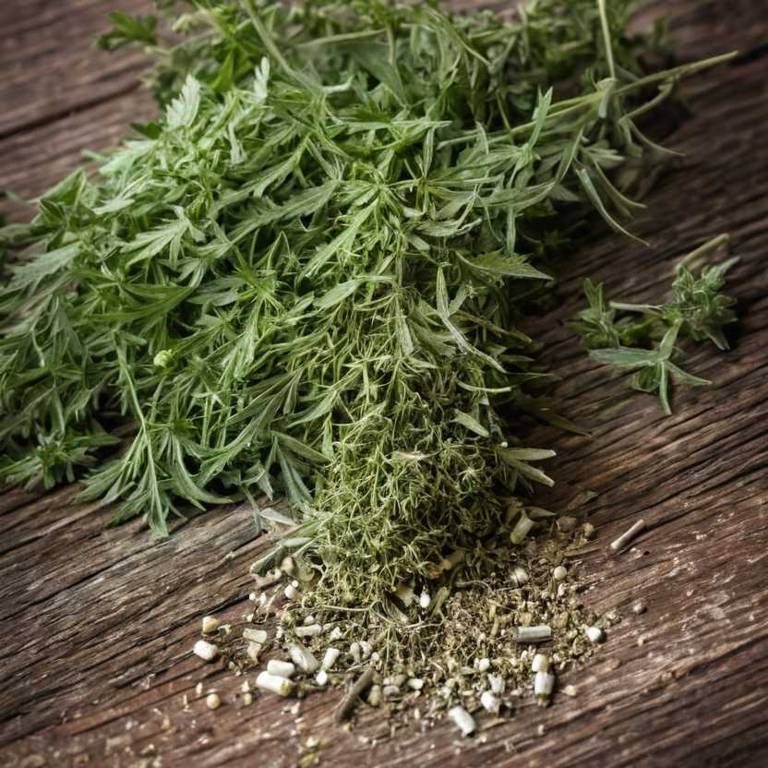By Leen Randell
Updated: Jul 06, 2024
10 Health Benefits Of Artemisia Absinthium (Wormwood)

Artemisia absinthium, also known as wormwood, has health benefits such as antimicrobial, anti-inflammatory, and antioxidant properties.
These properties make it effective in treating digestive issues, such as indigestion and nausea, and relieving pain. It also has antihelmintic properties, making it useful against parasites and worms.
The benefits of wormwood can improve people's lives by promoting overall health, reducing symptoms of anxiety and depression, and alleviating discomfort caused by digestive problems.
This article explains in details the 10 best health benefits of Artemisia absinthium.
- 1. Alleviates irritable bowel syndrome
- 2. Reduces fever and inflammation
- 3. Acts as a natural antiparasitic
- 4. Stimulates digestion and appetite
- 5. Helps manage type 2 diabetes
- 6. Exhibits antimicrobial properties
- 7. Protects against neurological disorders
- 8. Improves liver health
- 9. Eases menstrual cramps
- 10. Alleviates allergies
1. Alleviates irritable bowel syndrome
Artemisia absinthium alleviates irritable bowel syndrome because of its anti-inflammatory and antispasmodic properties.
The herb's essential oils, particularly absinthin, have been shown to reduce inflammation in the gut lining, thereby reducing symptoms such as abdominal pain, bloating, and cramping.
Additionally, wormwood's spasmolytic effects help to relax smooth muscle contractions in the digestive tract, allowing for improved bowel movements and reduced spasms.
2. Reduces fever and inflammation
Artemisia absinthium reduces fever and inflammation because of its potent bioactive compounds.
Specifically, the plant's essential oils, such as thujone and camphor, possess anti-inflammatory properties that help to soothe and calm inflamed tissues. Additionally, wormwood's flavonoids and phenolic acids exhibit antipyretic effects, reducing the body's temperature-regulating mechanisms to alleviate fever.
This dual action enables wormwood to provide effective relief from symptoms associated with fever and inflammation.
3. Acts as a natural antiparasitic
Artemisia absinthium acts as a natural antiparasitic because it contains compounds such as sesquiterpenes and flavonoids that exhibit potent anthelmintic properties.
These bioactive molecules have been shown to disrupt the life cycles of various parasitic worms, including tapeworms and roundworms, by altering their metabolism and preventing them from attaching to host tissues.
Additionally, wormwood's antimicrobial properties may also help to suppress secondary infections that can complicate parasitic infestations.
4. Stimulates digestion and appetite
Artemisia absinthium stimulates digestion and appetite because of its unique chemical composition.
The herb contains bitter compounds like absinthin and anabsinthine that stimulate the digestive system by increasing the production of stomach acid and enzymes. This enhanced digestive activity breaks down food more efficiently, relieving symptoms of indigestion and nausea.
Additionally, wormwood's bitter taste stimulates appetite by activating the brain's reward centers, increasing hunger and improving overall nutritional absorption.
5. Helps manage type 2 diabetes
Artemisia absinthium helps manage type 2 diabetes because it possesses potent anti-inflammatory and antioxidant properties.
Its flavonoids and lignans have been shown to improve insulin sensitivity, reduce glucose levels, and alleviate symptoms of hyperglycemia. Additionally, wormwood has been found to inhibit the activity of α-glucosidase enzymes, which slows down carbohydrate digestion and absorption, thereby reducing postprandial blood sugar spikes.
This natural remedy offers a potential complementary approach to conventional diabetes treatment.
6. Exhibits antimicrobial properties
Artemisia absinthium exhibits antimicrobial properties because of its unique chemical composition.
The plant contains a range of compounds, including sesquiterpenes and flavonoids, which have been shown to inhibit the growth of various microorganisms, including bacteria, fungi, and protozoa.
These bioactive compounds interact with the cell membranes of these microorganisms, disrupting their structure and function, thereby preventing them from multiplying and causing disease.
7. Protects against neurological disorders
Artemisia absinthium protects against neurological disorders because of its unique composition of compounds, particularly sesquiterpenes and flavonoids.
These bioactive molecules have been shown to possess potent antioxidant and anti-inflammatory properties, which help mitigate oxidative stress and inflammation in the brain, common underlying mechanisms of neurodegenerative diseases such as Alzheimer's, Parkinson's, and Huntington's.
By reducing oxidative damage and inflammation, wormwood may help prevent or slow the progression of these debilitating conditions.
8. Improves liver health
Artemisia absinthium improves liver health because of its potent antioxidant and anti-inflammatory properties.
The plant's bioactive compounds, such as thujone and sesquiterpenes, help to reduce oxidative stress and inflammation in the liver, which can damage liver cells and lead to conditions like cirrhosis and fibrosis.
By promoting liver detoxification and protecting against cell damage, wormwood may help to improve overall liver function and reduce the risk of liver disease.
9. Eases menstrual cramps
Artemisia absinthium eases menstrual cramps because it contains sesquiterpenoids, a type of compound that has natural analgesic and anti-inflammatory properties.
When consumed as tea or supplement, these compounds help to relax the uterine muscles, reducing spasms and cramping associated with menstruation.
Additionally, wormwood's antispasmodic effects can help alleviate bloating, nausea, and mood swings commonly experienced during PMS, providing relief for women suffering from menstrual discomfort.
10. Alleviates allergies
Artemisia absinthium alleviates allergies because of its unique combination of bioactive compounds, including sesquiterpenes, flavonoids, and terpenoids.
These compounds have been shown to possess anti-inflammatory and antioxidant properties, which can help reduce histamine release and alleviate symptoms associated with allergic reactions.
Additionally, wormwood has been found to inhibit the activation of mast cells, a key player in allergic responses, making it a valuable natural remedy for those suffering from allergies.